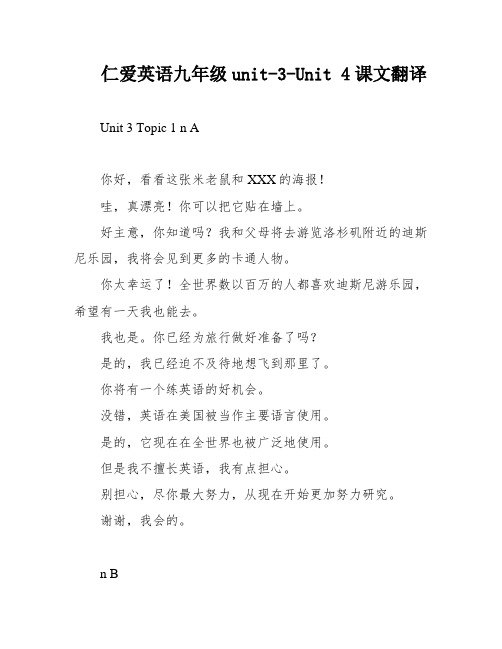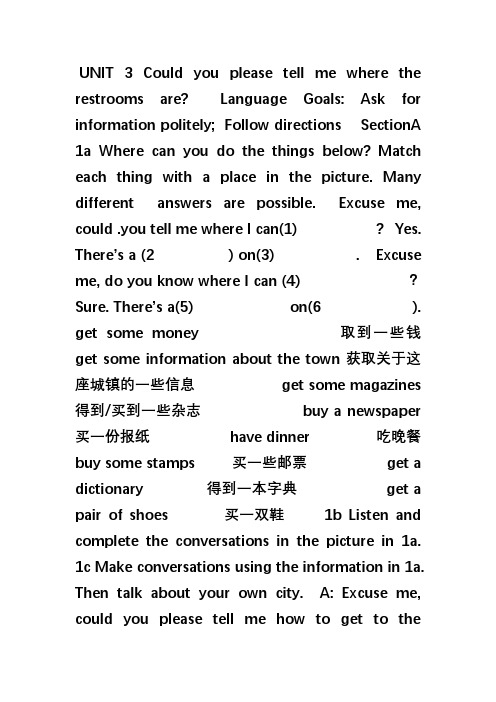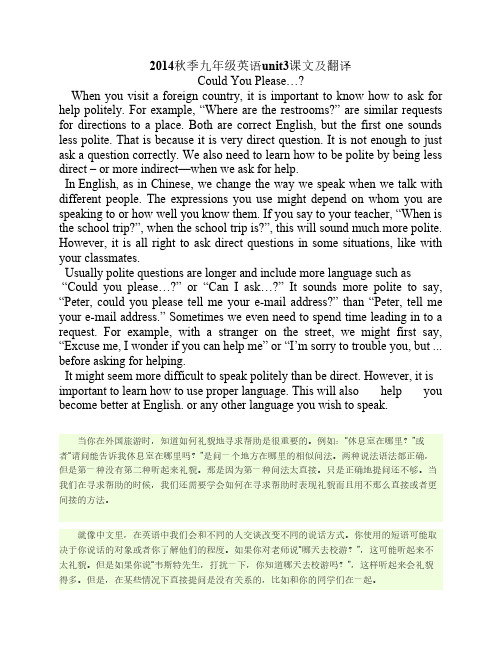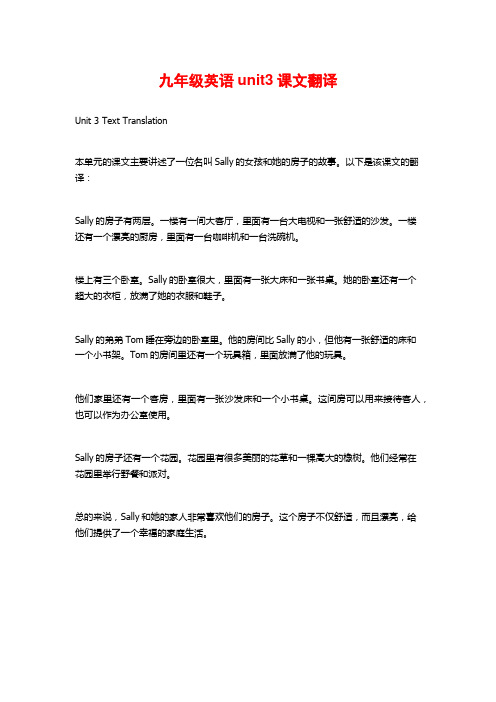2014秋季九年级英语unit3课文及翻译
九年级英语3a课文翻译

九年级英语3a课文翻译Unit 3A: When you are afraid of something, what do you say? (当你害怕某事时,你会说什么?)Lesson 1: I'm scared of thunderstorms. (我害怕雷暴。
)I'm scared of thunderstorms. Whenever there is a thunderstorm, I hide under my blanket and cover my ears. The loud thunder and bright lightning scare me. Sometimes, I even scream. I know it's silly, but I just can't help it. I wish I wasn't so scared.Lesson 2: That movie was terrifying! (那部电影太可怕了!) That movie was terrifying! It was a horror movie about a haunted house. I watched it with my friends last night. The movie was so suspenseful and full of jump scares. I screamed so many times during the movie. Now I'm too scared to sleep. I keep imagining creepy things in my room. I'm never watching a horror movie again!Lesson 3: Don't worry, it's just a spider. (别担心,那只是一只蜘蛛。
仁爱英语九年级unit-3-Unit 4课文翻译

仁爱英语九年级unit-3-Unit 4课文翻译Unit 3 Topic 1 n A你好,看看这张米老鼠和XXX的海报!哇,真漂亮!你可以把它贴在墙上。
好主意,你知道吗?我和父母将去游览洛杉矶附近的迪斯尼乐园,我将会见到更多的卡通人物。
你太幸运了!全世界数以百万的人都喜欢迪斯尼游乐园,希望有一天我也能去。
我也是。
你已经为旅行做好准备了吗?是的,我已经迫不及待地想飞到那里了。
你将有一个练英语的好机会。
没错,英语在美国被当作主要语言使用。
是的,它现在在全世界也被广泛地使用。
但是我不擅长英语,我有点担心。
别担心,尽你最大努力,从现在开始更加努力研究。
谢谢,我会的。
n BXXX的父亲在去古巴之前,正在与她交谈。
)爸爸,你为什么在整理你的包?我今晚要去古巴出差。
你看见我的护照了吗?它在你的床头柜上。
爸爸,在古巴,英语被用作官方语言吗?不是,西班牙语是那里的官方语言。
西班牙语和英语相似吗?不完全相似,或许有些单词是一样的。
我明白了。
你与人交流可能会遇到一些麻烦吗?是的。
我想我不会用西班牙语进行长时间的交谈。
如果有必要,我会请一名翻译来帮忙。
翻译会向你介绍这个国家的文化吗?当然。
了解语言和文化有助于我顺利工作。
一路顺风,祝你成功!n C全球有超过3000种语言被使用,而英语是使用最广泛的一种。
最新调查表明,母语为英语的人数超过5亿。
源于英国的语言被英国商人和英国新开发的殖民地政府传播到了全世界。
其中一个新殖民地成为了美利坚合众国。
美国有三亿九千万人口,是以英语为母语人数最多的国家。
大约3亿人把英语作为他们的第二语言。
在中国和日本,以及欧洲,更多的人把英语作为外语来研究。
英语已经成为了国际贸易、世界航空、甚至因特网的基本语言。
如果在这些领域工作,无论人们说什么语言,他们都需要知道一些英语。
显然,英语已经变得更加重要。
n D英语越来越广泛地在世界各地使用。
为什么会发生这种现象?我们也许可以从历史中找出答案。
在19世纪,英国成为一个有实力的国家,因此英语成为了一种国际语言。
2014人教新目标九年级英语unit3课文及详解

UNIT 3 Could you please tell me where the restrooms are? Language Goals: Ask for information politely; Follow directions SectionA 1a Where can you do the things below? Match each thing with a place in the picture. Many different answers are possible. Excuse me, could .you tell me where I can(1) ? Yes. There’s a (2 ) on(3) . Excuse me, do you know where I can (4) ?Sure. There’sa(5) on(6 ). get some money 取到一些钱 get some information about the town 获取关于这座城镇的一些信息 get some magazines 得到/买到一些杂志 buy a newspaper 买一份报纸have dinner 吃晚餐 buy some stamps 买一些邮票 get a dictionary 得到一本字典 get a pair of shoes 买一双鞋 1b Listen and complete the conversations in the picture in1a. 1c Make conversations using the information in 1a. Then talk about your own city. A: Excuse me, could you please tell me how to get to the bookstore? B: Sure, just go along Main Street until you pass Center Street. The bookstore is on your right, next to the bank. A:Thanks. Do you know when they close today? B: They close at 7:00 p.m. today. 打扰一下,请你告诉我如何去书店好吗?当然,就沿着主大街向前走,一直到你经过中心大街。
2014秋季九年级英语unit3课文及 翻译

2014秋季九年级英语unit3课文及翻译Could You Please…?When you visit a foreign country, it is important to know how to ask for help politely. For example, “Where are the restrooms?” are similar requests for directions to a place. Both are correct English, but the first one sounds less polite. That is because it is very direct question. It is not enough to just ask a question correctly. We also need to learn how to be polite by being less direct – or more indirect—when we ask for help.In English, as in Chinese, we change the way we speak when we talk with different people. The expressions you use might depend on whom you are speaking to or how well you know them. If you say to your teacher, “When is the school trip?”, when the school trip is?”, this will sound much more polite. However, it is all right to ask direct questions in some situations, like with your classmates.Usually polite questions are longer and include more language such as“Could you please…?” or “Can I ask…?” It sounds more polite to say,“Peter, could you please tell me your e-mail address?” than “Peter, tell me your e-mail address.” Sometimes we even need to spend time leading in to a request. For example, with a stranger on the street, we might first say,“Excuse me, I wonder if you can help me” or “I’m sorry to trouble you, but ... before asking for helping.It might seem more difficult to speak politely than be direct. However, it is important to learn how to use proper language. This will also help you become better at English. or any other language you wish to speak.当你在外国旅游时,知道如何礼貌地寻求帮助是很重要的。
(完整word)2014人教版九年级英语Unit3英汉互译

2014人教版新目标初中英语九年级Unit 3课文翻译Could you please tell me where the restrooms are?Role-play the conversation. 分角色表演以下对话。
He Wei: This is Fun Times Park – the biggest amusement park in my city!Alice: I’m excited to try the rides!He Wei: Where should we start? There’s Space World, Water World, Animal World...Alice: Oh, could you tell me where the restrooms are first?He Wei: Pardon? Restroom? You already want to rest? But we haven’t even started yet! Alice: Oh no, I don’t t mean a room for resting. I mean ... you know, a washroom or bathroom. He Wei: Hmm ... so you mean ... the toilets?Alice: Yes! Sorry, maybe the word “restroom” is not commonly used in China.He Wei: Right, we normally say “toilets” or “washrooms”. They’re just over there.Alice: OK. I’ll be quick! I wonder when the park closes today.He Wei: Nine-thirty, so you don’t need to rush!何伟:这是欢乐时光公园——我所在城市最大的游乐园!艾丽斯:要尝试一些乘骑项目,我好兴奋呀!何伟:我们应该从哪里开始玩呢?有太空世界、水上世界、动物世界……艾丽斯:哦,你能先告诉我哪儿有洗手间吗?何伟:什么?休息室?你想要休息吗?但是我们还没有开始玩呢!艾丽斯:哦,不是,我的意思不是休息间。
2014秋季九年级英语unit3课文及翻译

2014秋季九年级英语unit3课文及翻译Could You Please…?When you visit a foreign country, it is important to know how to ask for help politely. For example, “Where are the restrooms?” are similar requests for directions to a place. Both are correct English, but the first one sounds less polite. That is because it is very direct question. It is not enough to just ask a question correctly. We also need to learn how to be polite by being less direct – or more indirect—when we ask for help.In English, as in Chinese, we change the way we speak when we talk with different people. The expressions you use might depend on whom you are speaking to or how well you know them. If you say to your teacher, “When is the school trip?”, when the school trip is?”, this will sound much more polite. However, it is all right to ask direct questions in some situations, like with your classmates.Usually polite questions are longer and include more language such as “Could you please…?” or “Can I ask…?” It sounds more polite to say, “Peter, could you please tell me your e-mail address?” than “Peter, tell me your e-mail address.” Sometimes we even need to spend time leading in to a request. For example, with a stranger on the street, we might first say, “Excuse me, I wonder if you can help me” or “I’m sorry to trouble you, but ... before asking for helping.It might seem more difficult to speak politely than be direct. However, it is important to learn how to use proper language. This will also help you become better at English. or any other language you wish to speak.当你在外国旅游时,知道如何礼貌地寻求帮助是很重要的。
九年级英语unit3课文翻译

九年级英语unit3课文翻译
Unit 3 Text Translation
本单元的课文主要讲述了一位名叫Sally的女孩和她的房子的故事。
以下是该课文的翻译:
Sally的房子有两层。
一楼有一间大客厅,里面有一台大电视和一张舒适的沙发。
一楼还有一个漂亮的厨房,里面有一台咖啡机和一台洗碗机。
楼上有三个卧室。
Sally的卧室很大,里面有一张大床和一张书桌。
她的卧室还有一个超大的衣柜,放满了她的衣服和鞋子。
Sally的弟弟Tom睡在旁边的卧室里。
他的房间比Sally的小,但他有一张舒适的床和
一个小书架。
Tom的房间里还有一个玩具箱,里面放满了他的玩具。
他们家里还有一个客房,里面有一张沙发床和一个小书桌。
这间房可以用来接待客人,也可以作为办公室使用。
Sally的房子还有一个花园。
花园里有很多美丽的花草和一棵高大的橡树。
他们经常在花园里举行野餐和派对。
总的来说,Sally和她的家人非常喜欢他们的房子。
这个房子不仅舒适,而且漂亮,给他们提供了一个幸福的家庭生活。
九年级英语unit3课文翻译1500字

九年级英语unit3课文翻译1500字Unit 3 Text Translation:Title: The Future of ScienceScience has always been a fascinating subject for people. It has enabled us to explore and understand the mysteries of the universe. As technology advances, the future of science seems promising with endless possibilities and discoveries waiting to be made.One area that holds great potential is space exploration. Although we have made significant progress in this area, there is still so much more to explore. Scientists are currently working on missions to other planets and even beyond our solar system. They hope to find answers to questions about the origin of life and whether there are other habitable planets in the universe. With the advancements in rocket technology and the development of space telescopes, the future of space exploration looks bright.Another field that is expected to grow exponentially is biotechnology. Scientists have been making remarkable progress in understanding and manipulating genes. This has led to the development of genetic engineering, which has the potential to transform medicine and agriculture. In the future, we may be able to cure genetic diseases and increase crop yields through genetic modifications. However, ethical concerns surrounding these advancements still need to be addressed.Energy is another area where science is making great strides. With the growing concern about climate change and the depletion of fossil fuels, scientists are working on finding alternative sources of energy. Renewable energy sources such as solar and wind power are becoming more efficient and cost-effective. In the future, we may rely less on fossil fuels and more on renewable energy, reducing our carbon footprint and ensuring a sustainable future.Artificial intelligence (AI) is revolutionizing many aspects of our lives and is expected to continue to do so in the future. AI has the potential to automate tasks, improve productivity, and enhance our quality of life. However, there are concerns about the ethical implications of AI, such as privacy and job loss. It is crucial for scientists and policymakers to address these issues to ensure responsible and beneficial use of AI.In conclusion, the future of science is exciting and filled with possibilities. From space exploration to biotechnology, energy, and artificial intelligence, science is continuously pushing boundaries and unlocking new frontiers. However, it is essential to consider the ethical implications and ensure responsible use of these advancements. As we venture into the future, science will play a crucial role in shaping our world and improving the quality of life for all.。
- 1、下载文档前请自行甄别文档内容的完整性,平台不提供额外的编辑、内容补充、找答案等附加服务。
- 2、"仅部分预览"的文档,不可在线预览部分如存在完整性等问题,可反馈申请退款(可完整预览的文档不适用该条件!)。
- 3、如文档侵犯您的权益,请联系客服反馈,我们会尽快为您处理(人工客服工作时间:9:00-18:30)。
2014秋季九年级英语unit3课文及翻译
Could You Please…?
When you visit a foreign country, it is important to know how to ask for help politely. For example, “Where are the restrooms?” are similar requests for directions to a place. Both are correct English, but the first one sounds less polite. That is because it is very direct question. It is not enough to just ask a question correctly. We also need to learn how to be polite by being less direct – or more indirect—when we ask for help.
In English, as in Chinese, we change the way we speak when we talk with different people. The expressions you use might depend on whom you are speaking to or how well you know them. If you say to your teacher, “When is the school trip?”, when the school trip is?”, this will sound much more polite. However, it is all right to ask direct questions in some situations, like with your classmates.
Usually polite questions are longer and include more language such as “Could you please…?” or “Can I ask…?” It sounds more polite to say, “Peter, could you please tell me your e-mail address?” than “Peter, tell me your e-mail address.” Sometimes we even need to spend time leading in to a request. For example, with a stranger on the street, we might first say, “Excuse me, I wonder if you can help me” or “I’m sorry to trouble you, but ... before asking for helping.
It might seem more difficult to speak politely than be direct. However, it is important to learn how to use proper language. This will also help you become better at English. or any other language you wish to speak.
当你在外国旅游时,知道如何礼貌地寻求帮助是很重要的。
例如:“休息室在哪里?”或者“请问能告诉我休息室在哪里吗?”是问一个地方在哪里的相似问法。
两种说法语法都正确,但是第一种没有第二种听起来礼貌。
那是因为第一种问法太直接。
只是正确地提问还不够。
当我们在寻求帮助的时候,我们还需要学会如何在寻求帮助时表现礼貌而且用不那么直接或者更间接的方法。
就像中文里,在英语中我们会和不同的人交谈改变不同的说话方式。
你使用的短语可能取决于你说话的对象或者你了解他们的程度。
如果你对老师说“哪天去校游?”,这可能听起来不太礼貌。
但是如果你说“韦斯特先生,打扰一下,你知道哪天去校游吗?”,这样听起来会礼貌得多。
但是,在某些情况下直接提问是没有关系的,比如和你的同学们在一起。
礼貌的问题通常比较长,而且包含例如“请问你能……?”或“我可以问一下……?”等更多的语言。
“彼得,请问你能告诉我你的邮箱地址吗?”比“彼得,告诉我你的邮箱地址。
”听起来更礼貌。
有时候我们甚至需要花时间来引到请求上。
例如,和陌生人在街上,我们可能会在寻求帮助前先开始说:“打扰一下,不知道你是否可以帮我”或者“很抱歉打扰你,但是……”
礼貌地说话比起直接说话可能看上去更难。
但是,学会如何使用正确的语言很重要。
这还会有助于你把英语学得更好,或者其他任何你想说的语言。
